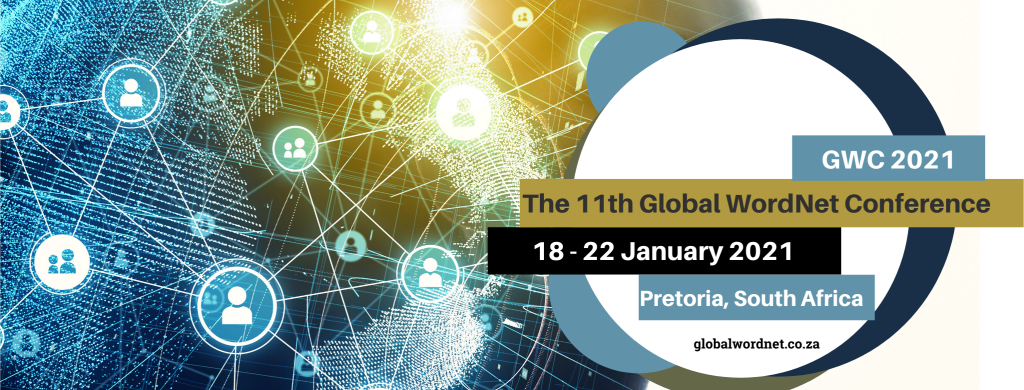Deadline extension ONLINE GWC2021: October 16th 2020
Global Wordnet Association: www.globalwordnet.org
Conference website: https://www.globalwordnet.co.za/
The deadline for submitting papers to the 11th Global Wordnet Conference (GWC2021) has been extended with a month to October 16th 2020.
The 11th International Global Wordnet Conference (GWC2021) will be held from 18 to 21 January as an online event due to COVID-19. The conference will be organized by the South African Centre for Digital Language Resources (SADiLaR) and GWA.
COVID19 Pandemic
A combination of the approaches successfully implemented by RAIL2020 and LREC2020 will be used as roadmap for the online event – authors will be asked to prerecord their presentations which will be streamed during a live virtual event with opportunity for questions and discussions after each presentation; proceedings will also be published and a reduced registration fee will be applicable.
Conference Topics
Contributions are invited on all aspects of wordnets, including but not limited to:
1. Lexical semantics and meaning representation
· Critical analysis and applications of lexical and semantic relations
· Proposed new relations
· Definitions, semantic components, co-occurrence and frequency statistics
· Word and Sense Embeddings
· Necessity and completeness issues
· Ontology and wordnet
· Other lexicographical and lexicological questions pertaining to wordnet-style meaning representation
· Wordnets and Linked Open Data (LOD)
2. Architecture of lexical databases
· Language independent and language dependent components
· Integration of multi-wordnets in research infrastructures (like CLARIN) and LT networks (like META-NET)
3. Tools and Methods for wordnet development
· User and Data entry interfaces
· Methods for constructing, extending and enriching wordnets
4. Applications of wordnet
· Word sense disambiguation
· Machine translation
· Information extraction and retrieval
· Document structuring and categorisation
· Automatic hyperlinking
· Language pedagogy
· Psycholinguistic applications
5. Standardization, distribution and availability of wordnets and wordnet tools.
Submission Guidelines
Submissions will fall into one of the following categories (page limits exclude references):
· long papers: 8 pages max, 30 minutes presentation
· short papers: 5 pages max; 15 minutes presentation
· project reports: 5 pages max., 10 minutes presentation
· demonstrations: 5 pages max, with an additional 3 pages screen dumps or images; 20 minutes presentation
· work in progress: 5 pages max., poster presentation
Submissions should be anonymous and any identifying information must be removed. Authors must state the preferred category, though acceptance may be subject to change in the category of the presentation, e.g. a long paper submission may be accepted as a short paper.
Final papers should be submitted in electronic form (PDF only).
Papers must be submitted to the EasyChair website: https://easychair.org/conferences/?conf=gwc2021
The format of the paper is in ACL format (PDF).
Important Dates
· 16th October 2020: Deadline for paper submission
· 23 October 2020: Notification of acceptance
· 20 October 2020: Registration opens
· 18 December 2020: Deadline for author registration, final paper due
· 18-21 January 2021: Online Conference
Proceedings
Conference proceedings will be open access and downloadable from the GWA website. The proceedings will have an ISBN and be published in the ACL anthology.
Papers are only included in the proceedings if at least one author has registered by 20 November 2020.
Inclusion of accepted submissions into the final program and the proceedings is contingent upon at least one author’s registration. Late registration and on-site registration for participants is possible without inclusion of the paper and without presentation.
Conference Chairs
Christiane Fellbaum, fellbaum@princeton.edu
Piek Vossen, piek.vossen@vu.nl
Local Organising Committee
Sonja Bosch – University of South Africa (UNISA)
Mampaka Lydia Mojapelo – University of South Africa (UNISA)
Marissa Griesel – University of South Africa (UNISA) (contact person: griesm@unisa.ac.za)
Elsabé Taljard – University of Pretoria (UP)
Juan Steyn – SADiLaR
Liané van den Berg – SADiLaR
Program Committee
Eneko Agirre University of the Basque Country
Sina Ahmadi Insight Centre for Data Analytics
Timothy Baldwin The University of Melbourne
Francis Bond Nanyang Technological University
Sonja Bosch Department of African Languages, University of South Africa
Paul Buitelaar Insight Centre for Data Analytics, National University of Ireland Galway
Bharathi Raja Chakravarthi Insight Centre for Data Analytics, National University of Ireland, Galway
Janos Csirik University of Szeged
Gerard de Melo Rutgers University
Valeria de Paiva Samsung Research America and University of Birmingham
Thierry Declerck DFKI GmbH
Bento C. Dias-Da-Silva UNESP
Umamaheswari E Research Fellow NTU Singapore
Christiane Fellbaum Princeton University
Leonel Figueiredo de Alencar UNIVERSIDADE FEDERAL DO CEARÁ
Hugo Gonçalo Oliveira University of Coimbra
Ales Horak Masaryk University, Faculty of Informatics
Shu-Kai Hsieh National Taiwan Normal University
Filip Ilievski Information Sciences Institute, University of Southern California
Diptesh Kanojia IIT Bombay
Kyoko Kanzaki Toyohashi University of Technology
Shikhar Kr. Sarma Gauhati University
David Lindemann UPV-EHU University of the Basque Country
Ahti Lohk Tallinn University of Technology
John P. McCrae National University of Ireland, Galway
Verginica Mititelu Romanian Academy Research Institute for Artificial Intelligence
Luis Morgado Da Costa Nanyang Technological University
Sanni Nimb Det Danske Sprog- og Litteraturselskab (DSL)
Sussi Olsen University of Copenhagen, Centre for Language Technology
Heili Orav University of Tartu
Bolette Pedersen University of Copenhagen
Maciej Piasecki Department of Computational Intelligence, Wroclaw University of Science and Technology
Marten Postma Vrije Universiteit Amsterdam
Alexandre Rademaker IBM Research Brazil and EMAp/FGV
German Rigau IXA Group, UPV/EHU
Ewa Rudnicka Wrocław University of Technology
Kevin Scannell Saint Louis University
Pia Sommerauer Vrije Universiteit Amsterdam
Kadri Vider University of Tartu
Piek Vossen Vrije Universiteit Amsterdam
Shan Wang University of Macau
